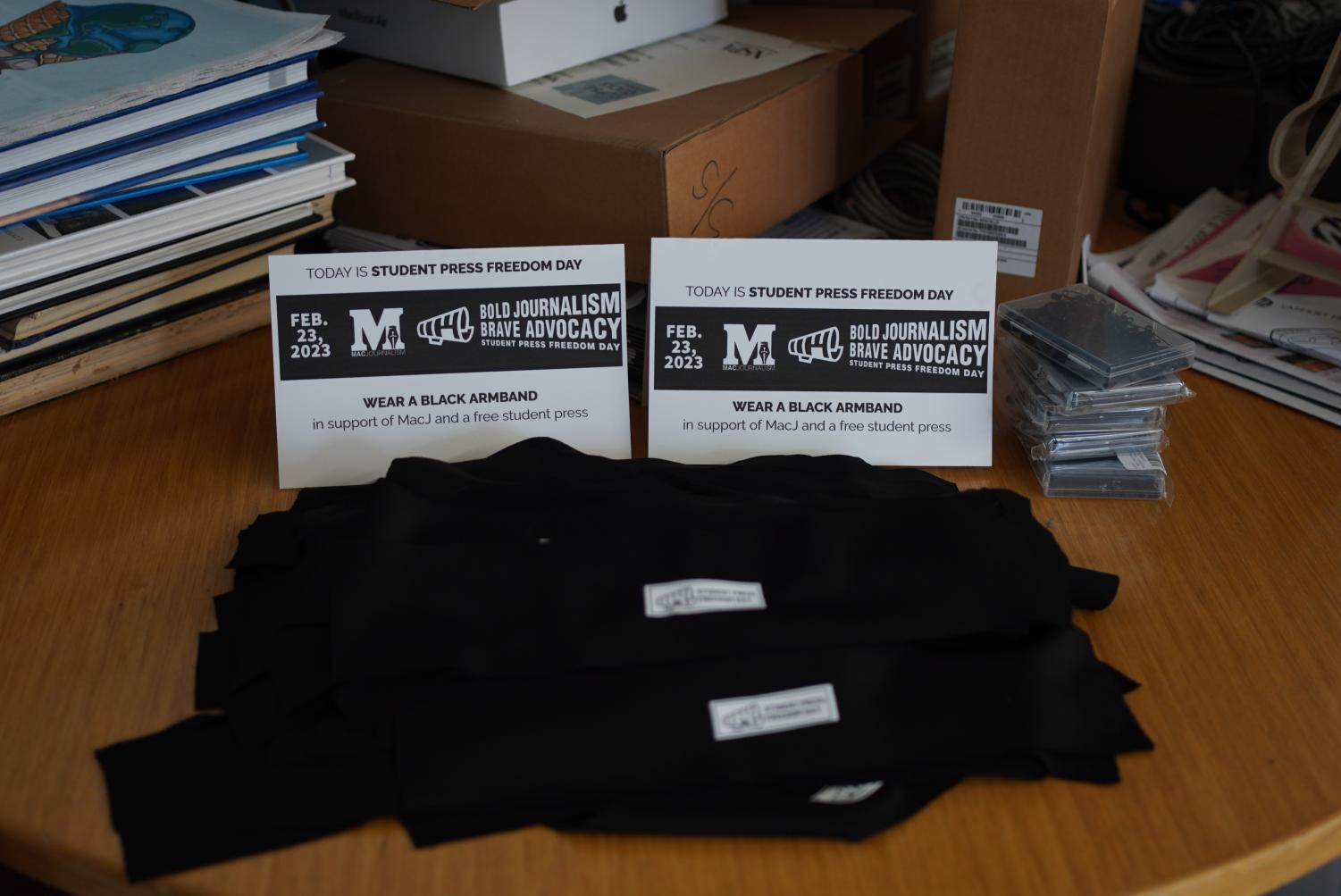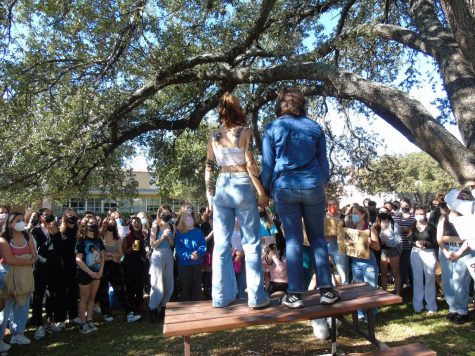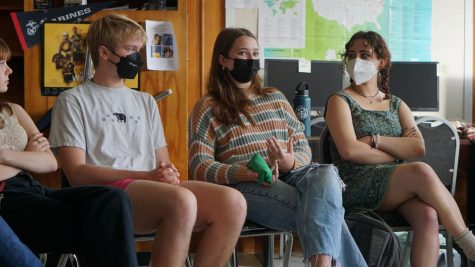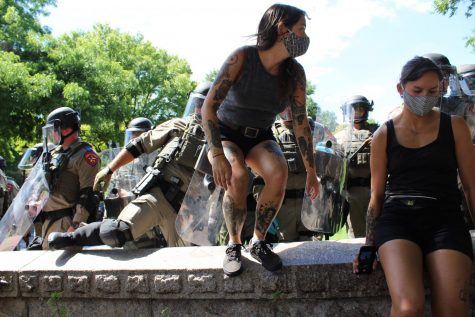MacJournalism recognizes Student Press Freedom Week
On 54th anniversary of Tinker v. Des Moines, Knights learn about history of scholastic journalism, wear black arm bands in support of New Voices movement's fight against censorship
February 25, 2023
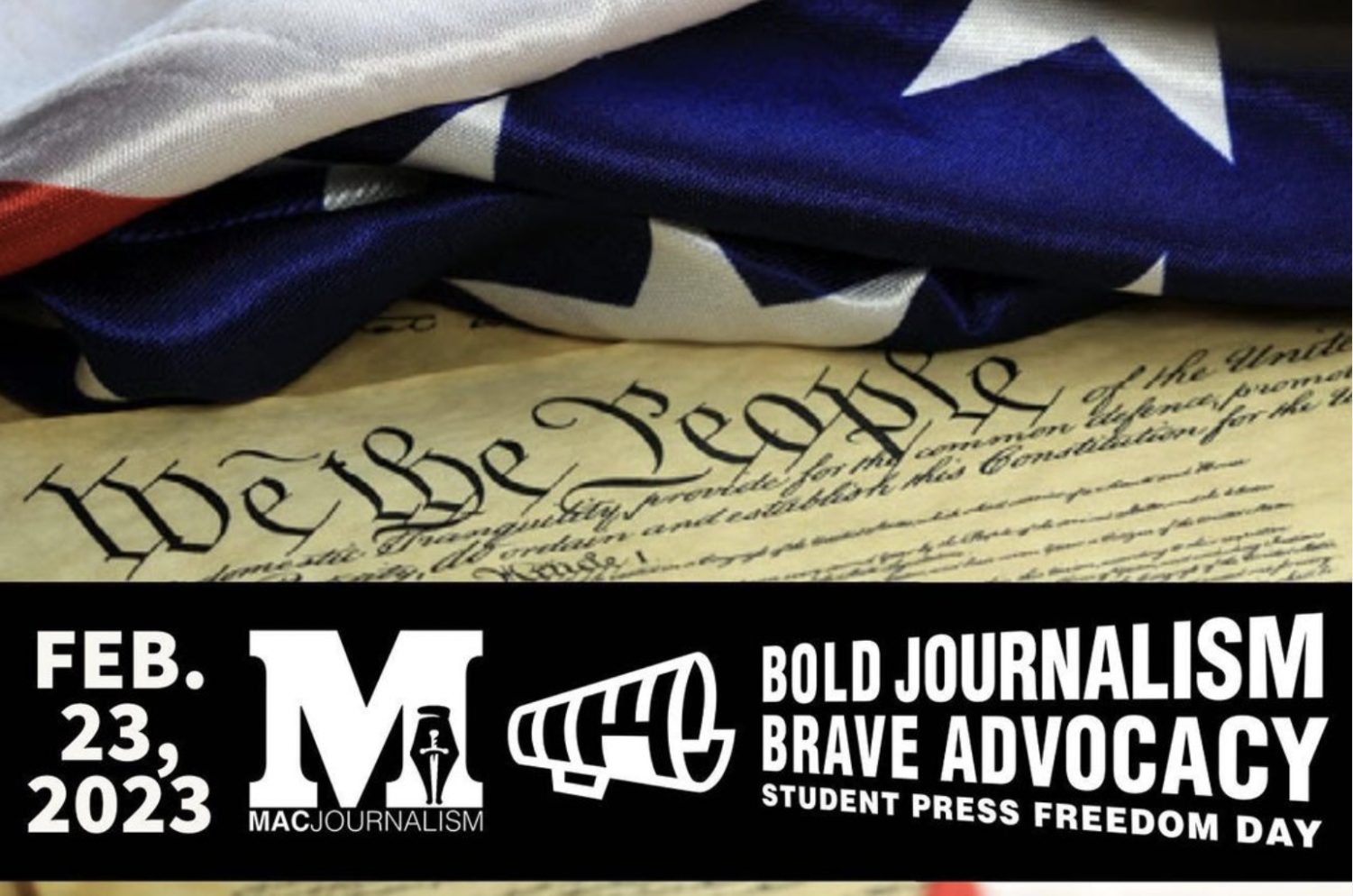
While the Constitution guarantees freedom of speech and press under the First Amendment, student journalists are not guaranteed those same rights thanks to the Hazelwood v. Kulhmeier ruling.
Monday, Feb. 20
Today kicks off the first day of MacJournalism’s Student Press Freedom Week in honor of the 54th anniversary of the landmark Supreme Court ruling in the Tinker v. Des Moines case this Friday, Feb. 24.
On Dec. 16, 1965, 13-year-old Mary Beth Tinker along with a group of students decided to wear black armbands to school in protest of the ongoing Vietnam War. When Tinker arrived at school, she was asked to remove her armband by school administration.
On Feb. 24, 1969 by a vote of 7-2, the Supreme Court ruled in favor of Tinker, declaring that neither students nor teachers ‘shed their constitutional rights to freedom of speech or expression at the schoolhouse gate.’
She was then suspended from school along with four other students including her brother John and his friend Chris Eckhardt. When the three returned to school, they did not return with black armbands but did wear black clothing for the rest of the school year in protest.
The Tinker family filed a free speech lawsuit against the Des Moines Independent Community School District that became a four-year court battle, culminating in a hearing with the Supreme Court. On Feb. 24, 1969 by a vote of 7-2, the Supreme Court ruled in favor of Tinker, declaring that neither students nor teachers “shed their constitutional rights to freedom of speech or expression at the schoolhouse gate.” The only exception to this ruling would be under the suspicion that the speech might disrupt the school environment.
This landmark verdict granted students the promise that their First Amendment rights would be protected. Due to a later 1988 ruling in Hazelwood vs. Kulhmeier, however, student presses are not granted the same protections afforded to students.
This week, MacJournalism will be posting detailed information about student press freedoms and the ongoing fight against student censorship. This Thursday, Feb. 23, you can show your support for student press freedom by picking up a black armband from room 134 to celebrate the fifth annual Student Press Freedom Day.
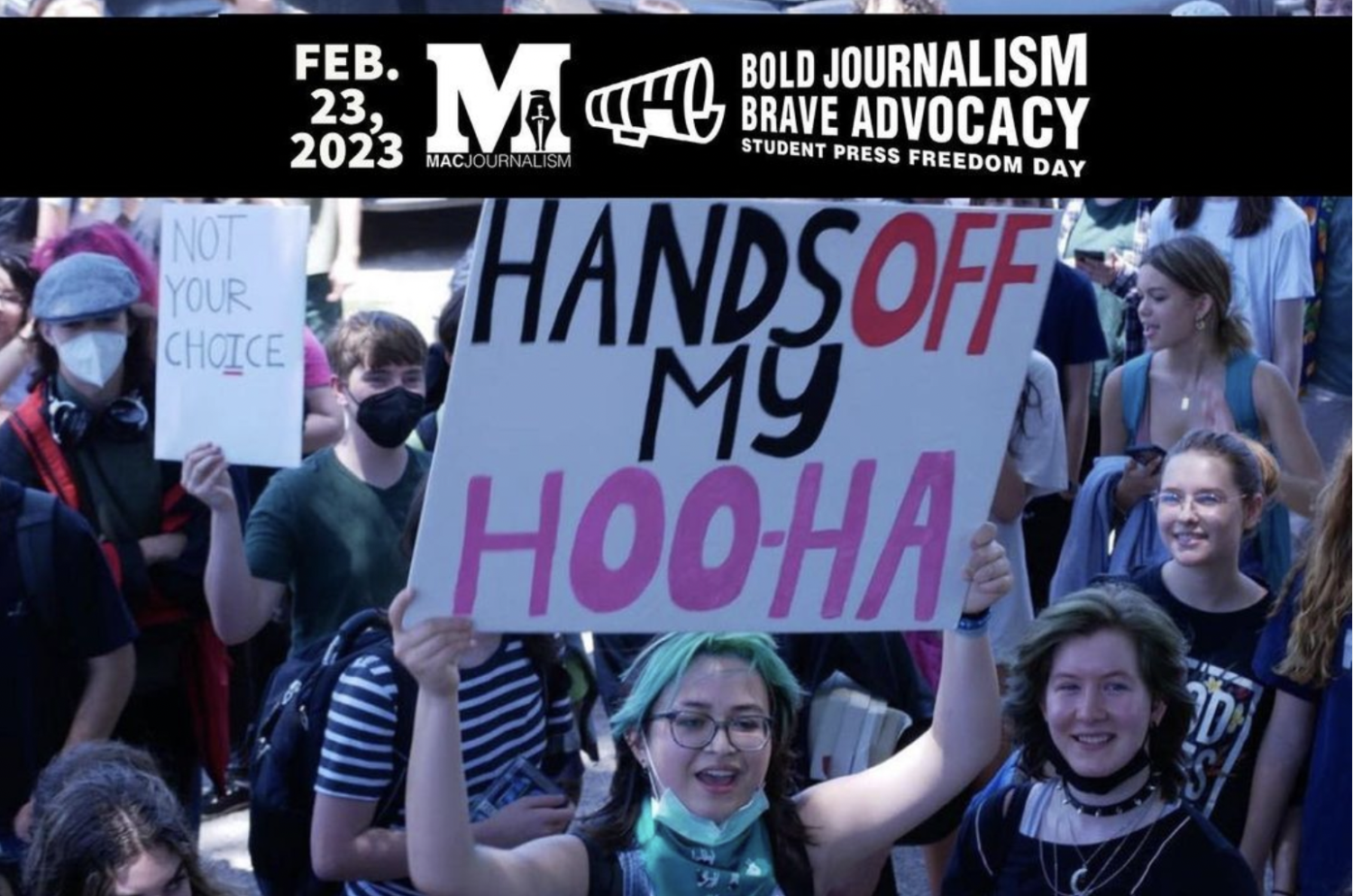
In the state of Texas, students have the right to protest on school grounds but are not guaranteed freedom of expression through school publications. Photo of abortion rights walkout from May 2022 by Cilley Phan.
Tuesday, Feb. 21
For the second day of MacJournalism’s Student Press Freedom Week, the story of student freedoms continues.
Nineteen years after the Tinker v. Des Moines ruling, the Supreme Court made a decision that continues to impact students’ rights to a free press today.
In 1983, student journalists writing for The Spectrum, the school newspaper at Hazelwood East High School in St. Louis County, Mo., wrote and proofed articles about teen pregnancy and divorce at their high school.
In a landmark decision, the Court ruled 5-3 in the case of Hazelwood v. Kulhmeier that school administration has the right to censor student-sponsored expression (such as student media programs) if they have a ‘legitimate pedagogical concern.’
Before the issue was published, the school’s principal Robert Eugene Reynolds removed the two pages containing those stories from the paper. The Spectrum staff was not informed of this decision and was only made aware of the change when the papers were delivered to the school.
Student editor Cathy Kuhlmeier and student reporters Leslie Smart and Leanne Tippett decided to file suit against the district in January 1984. The case made its way through the lower courts and eventually was tried in the Supreme Court in 1988. In a landmark decision, the Court ruled 5-3 in the case of Hazelwood v. Kulhmeier that school administration has the right to censor student-sponsored expression (such as student media programs) if they have a “legitimate pedagogical concern.”
Because there was no set definition of a “legitimate pedagogical concern,” many school administrations have been able to practice rigid and arbitrary censorship of student publications. Since the ruling, a student-run grassroots movement called New Voices has been working to pass laws across the country prohibiting student censorship. Currently, there are 16 states with this type of legislation.
Over the next week, we will continue to inform you about the New Voices campaign and the work being done in Texas to protect student journalists from censorship. This Thursday, Feb. 23, you can show your support for student press freedom by picking up a black armband from room 134 to celebrate the fifth annual Student Press Freedom Day.
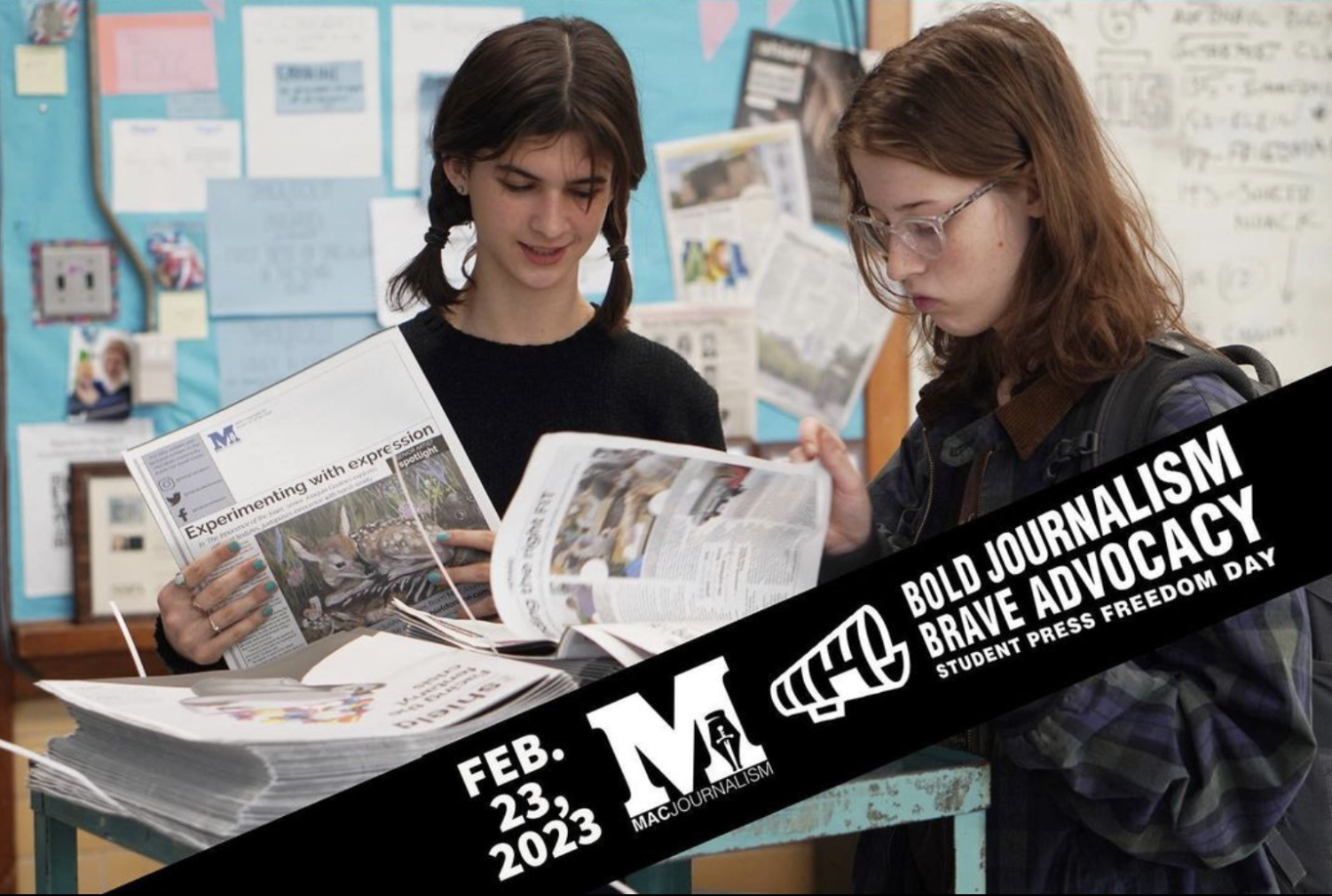
Photo of juniors Lanie Sepehri and Meredith Grotevant preparing for distribution of Issue 2 of the Shield.
Wednesday Feb. 23
For our third day of Student Press Freedom Week, we’d like to introduce you to New Voices, a student-driven grassroots movement devoted to prohibiting student media censorship.
The legacy of the Hazelwood v. Kuhlmeier ruling from 1988 persists today. Student publications across the country find themselves victims of censorship by administration. In response, New Voices, which was spurred by the John Wall New Voices Act of North Dakota that passed unanimously and was written into law in 2015, is a movement that is going state by state to pass legislation prohibiting the censorship of student publications.
Under a New Voices law, administrators are prohibited from censoring their students or retaliating against student media advisers who refuse to censor their students.
New Voices legislation restores student presses to the Tinker Standard and allows student journalists to exercise their rights to freedom of speech, expression and the press. Under a New Voices law, administrators are prohibited from censoring their students or retaliating against student media advisers who refuse to censor their students. In addition, student journalists are subject to the same code of ethics as professional journalists.
Currently, there are 16 U.S. states that have enacted New Voices laws. Last year, on May 23, Hawaii became the most recent state to join this list. In Texas, which has not adopted New Voices legislation, student journalists across the state can and are being subject to censorship by school administration.
Texas does have an existing New Voices campaign, led by David Doerr, the journalism adviser at Akins High School in Austin, along with a group of student officers located throughout the state who are working to protect student journalists’ rights.
To show your support for student press freedom and to be an advocate for change in Texas, pick up a black armband from room 134 tomorrow to celebrate the fifth annual Student Press Freedom Day.
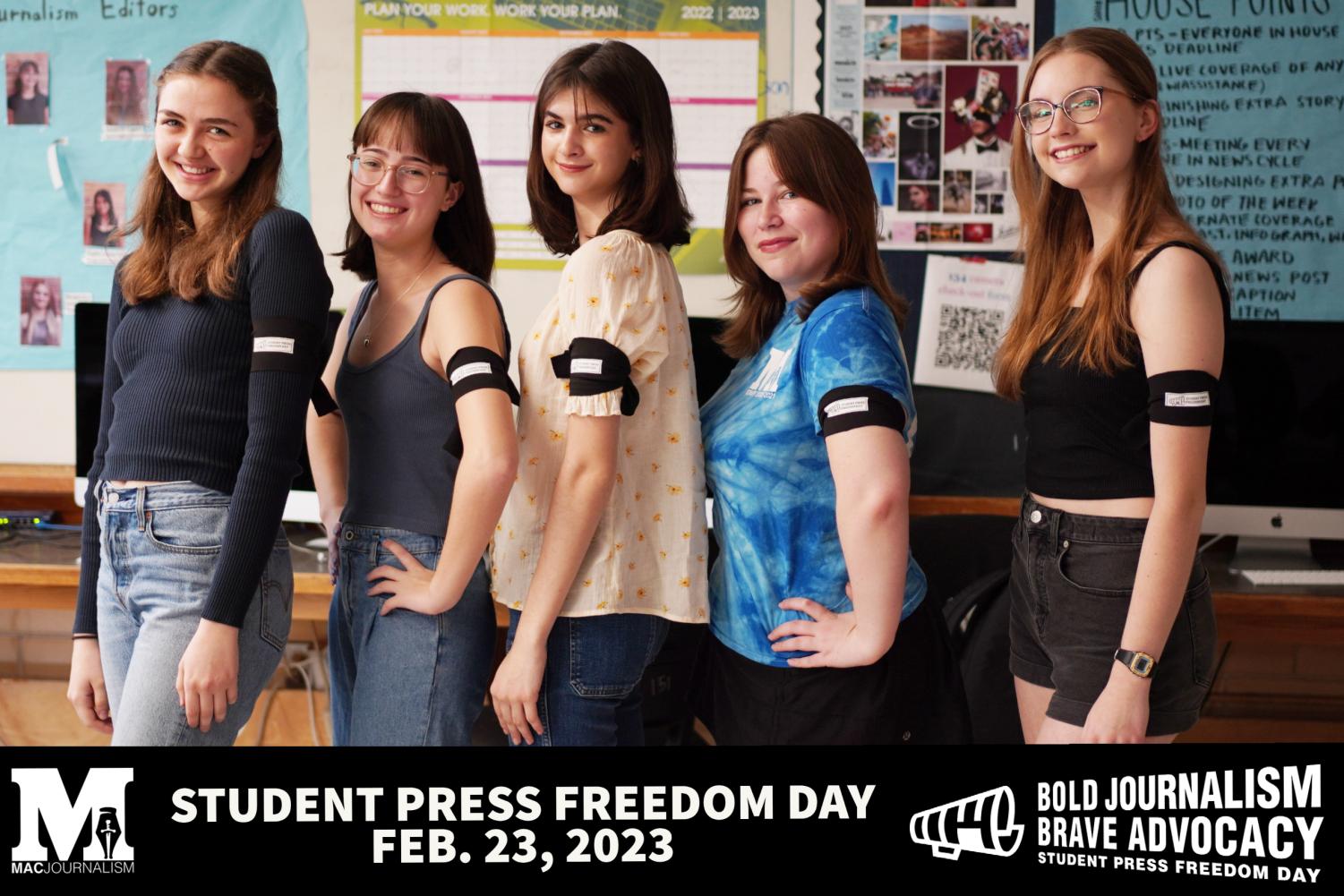
MacJournalism celebrated the Student Press Law Center’s fifth annual Student Press Freedom Day on Thursday. To show their support for students’ right to freedom of the press, they wore black armbands and provided them for any students, teachers or administrators who wanted to join them by picking up an armband in the newspaper classroom, room 134. Pictured in the photo: junior Shield staffers Naomi Di-Capua, Francie Wilhelm, Lanie Sepehri, Alice Scott and Ingrid Smith sporting their Student Press Freedom Day armbands.
Thursday Feb. 23
Awareness and school support marked the fourth day of Student Press Freedom Week at McCallum.
In honor of the fifth annual Student Press Freedom Day, MacJ staff provided black armbands to school community members who wanted to show their support of school publications and free student press.
Principal Nicole Griffith and Shield co-editors-in-chief, Evie Barnard and Alice Scott, committed to taking a stand against censorship in school publications by signing the New Voices Texas pledge.
Throughout the day, student journalists on the MacJ staff visited social studies classes around campus to provide awareness about important Supreme Court precedents like Tinker and Hazelwood and their impact on scholastic journalism programs across the country.
While 16 states have New Voices laws to protect the rights of student journalists, Texas has yet to adopt this legislation. Shield staffers provided their fellow students with details on how to be involved in change and how to learn more about the New Voices Texas initiative.
Principal Nicole Griffith and Shield co-editors-in-chief, Evie Barnard and Alice Scott, committed to taking a stand against censorship in school publications by signing the New Voices Texas pledge.
With more class presentations scheduled for tomorrow, MacJ will close out this week with continued education of the school community as we celebrate the fifty-fourth anniversary of the Supreme Court ruling in Tinker vs. Des Moines. If you missed your opportunity to pick up a black armband, stop by room 134 tomorrow. We still have a few left.
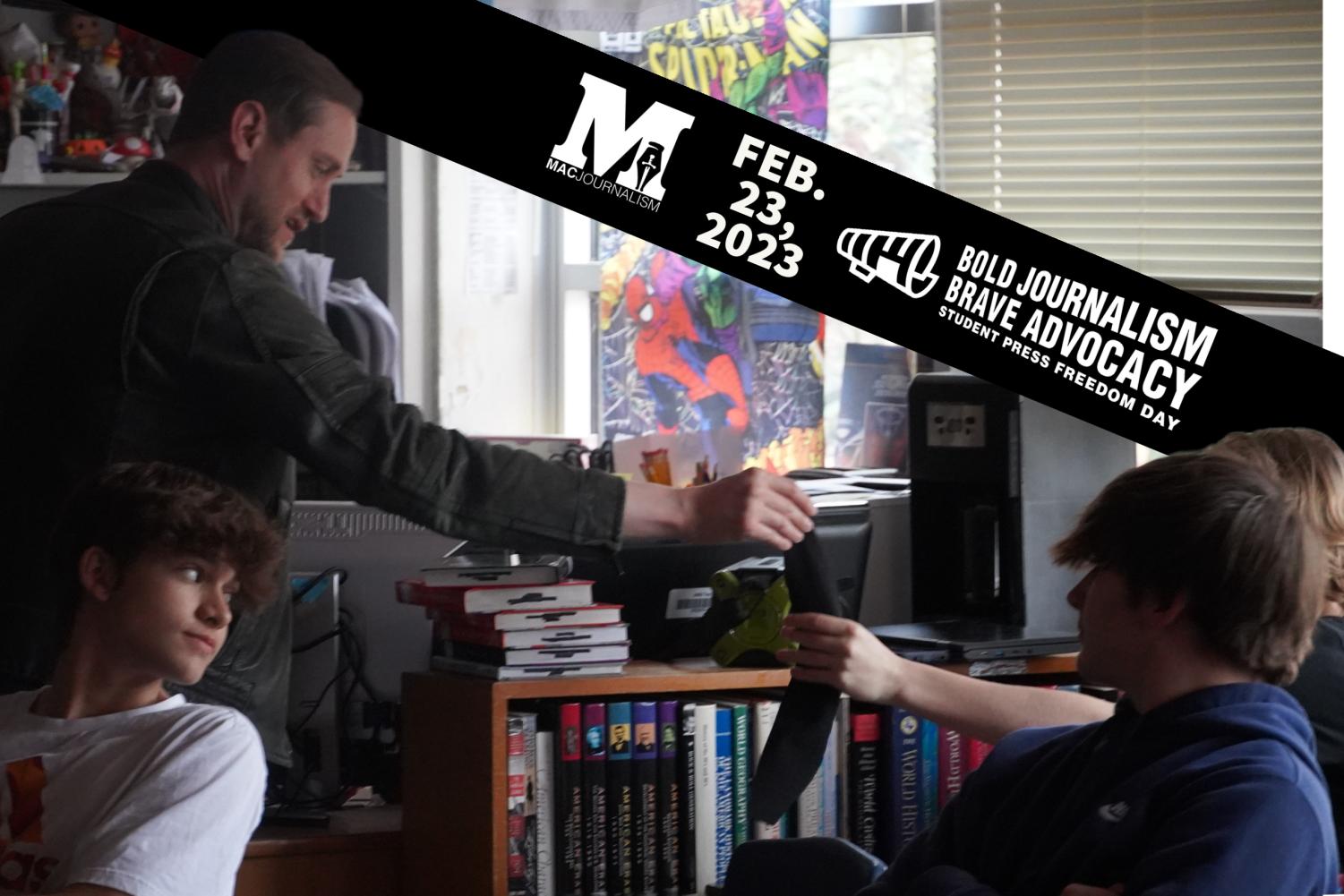
After Shield co-editor in chief Evie Barnard presented a guest lecture to the class about student press rights and the New Voices campaign, Mr. Anderson passes out Student Press Freedom Day arm bands to his eighth-period students who asked for them.
Friday Feb. 24
Student Press Freedom Week activities continued today as student journalists celebrated the 54th anniversary of the landmark Supreme Court ruling in the case of Tinker v. Des Moines.
Members of the MacJ staff continued their presentations in A-day history classes, working to inform the student body on the history of student press freedom in America. Across campus students and faculty sported their Student Press Freedom Day armbands, paying homage to the armbands used in the Tinker case.
The Knight yearbook staff celebrated student press freedom with editor-in-chief Charlie Partheymuller signing the New Voices Texas publication pledge.
Presentations covered the details of precedent court cases that have affected students’ rights to a free press and the New Voices movement. Students also learned about specific instances of student press censorship in Texas, including an instance that occurred at McCallum back in 1997.
The Knight yearbook staff celebrated student press freedom with editor-in-chief Charlie Partheymuller signing the New Voices Texas publication pledge, adding the Knight to the list of student publications in Texas that stand with the New Voices movement.
The Shield online we co-managing editors celebrated at lunchtime after the NSPA associate director Gary Lundgren announced the Shield as one of 24 national Online Pacemaker Award finalists.
As the week comes to a close, all of us here at MacJournalism would like to thank the members of the McCallum community who have shown up and shown out with their support of a free student press. To learn more about student press censorship and the New Voices movement, visit the Student Press Law Center website.
